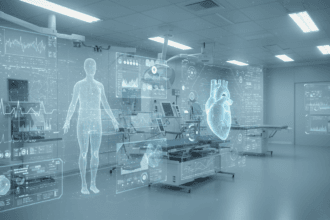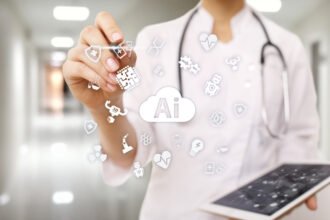Artificial Intelligence is the key to advancing healthcare. The faster healthcare application development professionals accept this fact, the easier it becomes to implement it. AI has surely rocked every other industry around the world with its great ideas and well-established concepts. For the healthcare industry, it surely has done more than a few right things that have proven to transform it and cause an impact like never before. Be it using machine learning for predictions or deploying robots to perform complex surgeries, AI and healthcare form a lively combination with the potential to change lives for the real.
AI and Healthcare: A Lively Combination
According to recent research carried out by the MIT technology review and GE Healthcare as many as 80 percent of the people claim that artificial intelligence has helped reduce clinical burnouts, leaving providers with much more time for their patients. And this is just the smallest impact of all the great deeds AI is bringing to the table of the healthcare industry. While most healthcare institutions are still figuring out the impact of artificial intelligence on business-critical factors like performance, efficiency, and workforce, there are many who are already reaping the benefits of cutting edge technology.
But there’s widespread fear among most of the organizations, especially those who are not very reluctant to adopting AI. They fear that the implementation of technology like artificial intelligence will remove the human touch from the industry and make it a series of automated, unsympathetic process. People assume that AI will remove the aspect from human workforce from the industry, which is one of the worst fears of the human race since the very inception of the ideas of AI in the 1940s. But. that’s not what is happening with the healthcare industry, at least as of now.
Instead of abolishing the human aspect of things, AI has its focus on something else. The same research by MIT and GE healthcare indicates that AI might be there to re-humanize the healthcare industry. And believe it or not, the healthcare industry does require more than just a human touch. Take a look around you to understand it more deeply. With the ever-increasing population, there are more and more healthcare issues arising on a daily basis.
The Underlying Challenges
This directly means more patients, more casualties and more people who need care services for their health. Even though there are plenty of public and private healthcare institutions around the world, nothing is ever sufficient to cater to the demands of all people at the same time. Thousands die just because they could not get into a healthcare facility in the shortest amount of time. Similarly, there are people who are not even aware of an ailing situation or those who are diagnosed much late and are at a point where they have only a couple of months to live. Moreover, many general physicians don’t even have the requisite tools to diagnose a condition to its core and just give away medicines based on a handful of symptoms. A lot of these cases escalate from their existing situation and turn out to be far worse when they are diagnosed at an advanced medical facility.
And this is just the deteriorating health condition. There are elderly, who are left alone or find it far more difficult to approach a healthcare center in times of need. Adding to this are the medical experts who are burned out because of their work pressure and mismanagement of patients. Many of healthcare professionals are still doing mundane tasks and take decisions based on inadequate information. They seldom know the complete history of the patient or their demographically information, and go ahead with prescribing a course of treatment.
Awareness: The Ray of Hope
But, as per the research more than 900 healthcare professionals who are already using AI in one form or the other in their organization have experienced immense benefits from it already. Medical experts are using AI to improve data analysis, enable better diagnosis, come up with efficient treatment predictions, and free medical staff from administrative burdens. And not just for a general level of services, but as the complexity in the healthcare industry increases, these findings become even more critical. This is all set to change the healthcare to a value-based system where the measure of success lies in finding out the outcome of services that the patients have received instead of figuring out the number of patients seen.
Healthcare organizations must strictly allow for fundamental shifts in the way patients are seen. They must be aware that technology exists to help them see through a case faster and with more efficiency. And it isn’t about questioning a medical expert’s ability but rather helping them provide care in a much faster and efficient way than they can normally do. After all, it might not even take seconds to lose a precious life.
Conclusion
Machines must at all costs work in collaboration with doctors and medical experts. We don’t expect it to be the converse, but just knowing that they exist only to assist healthcare services is a great step. Spreading awareness on what all artificial intelligence solutions can do with concrete medical impact can help professionals see through the technology with a more humanized approach and let’s accept it. No medical expert would like to spend hours entering the patient’s information into the system instead of drawing inferences from it. So, why not let AI do the best of what it does by implementing it in the healthcare industry and letting it look at a far more comprehensive set of parameters that ultimately help in making better medical decisions and performing a comprehensive diagnosis for patients.










